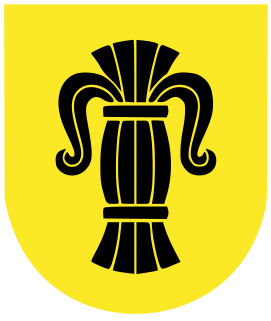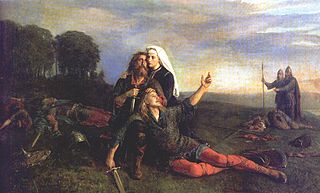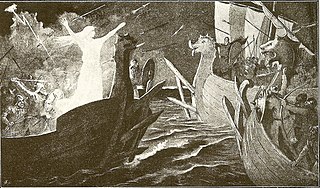See also
Name list
This page or section lists people that share the same given name. If an internal link led you here, you may wish to change that link to point directly to the intended article.
Kettil is a given name. Notable people with the name include:
Year 1465 (MCDLXV) was a common year starting on Tuesday of the Julian calendar.

Kettil Karlsson (Vasa) was a Swedish clergyman, diplomat, military leader and statesman during the Kalmar Union era. He was a member of the house of Vasa. At age 25, he was elected Bishop of Linköping. He rebelled against King Christian I in 1463, was Captain General (rikshövitsman) and de facto regent of Sweden from February to August 1464, stepping down during the brief return of King Charles Canutesson from exile. After falling out with King Charles, Kettil Karlsson was subsequently elected Lord Protector and Regent (riksföreståndare) of Sweden from 26 December 1464 to his death.

A legendary saga or fornaldarsaga is a Norse saga that, unlike the Icelanders' sagas, takes place before the settlement of Iceland. There are some exceptions, such as Yngvars saga víðförla, which takes place in the 11th century. The sagas were probably all written in Iceland, from about the middle of the 13th century to about 1400, although it is possible that some may be of a later date, such as Hrólfs saga kraka.
Helge or Helgi is a Scandinavian, German, and Dutch mostly male name.

Hålogaland was the northernmost of the Norwegian provinces in the medieval Norse sagas. In the early Viking Age, before Harald Fairhair, Hålogaland was a kingdom extending between the Namdalen valley in Trøndelag county and the Lyngen fjord in Troms og Finnmark county.
Ingeborg is a Germanic feminine given name, mostly used in Germany, Denmark, Sweden and Norway, derived from Old Norse Ingiborg, Ingibjǫrg, combining the theonym Ing with the element borg "stronghold, protection". Ingebjørg is the Norwegian most used variant of the name, and Ingibjörg is the Icelandic variant.
Rolf is a male given name and a surname. It originates in the Germanic name Hrolf, itself a contraction of Hrodwulf (Rudolf), a conjunction of the stem words hrod ("renown") + wulf ("wolf"). The Old Norse cognate is Hrólfr. An alternative but less common variation of Rolf in Norway is Rolv.
Erik Årsäll was a semi-historical king of Sweden. His historicity has been called into question. He is dated by some to the end of the 11th century, by others to the 1120s, while more critical historians believe that he is a legendary name belonging to the 10th century. According to some, he was the son of the pagan Swedish king Blót-Sweyn, and, like his father before him, administered the blóts at the temple at Uppsala. However, Erik does not appear in any Swedish or Danish primary sources.
Karlsson is a Scandinavian patronymic surname meaning "son of Karl" or "Karl's son". It is one of the most common surnames in Sweden and has a number of alternative spellings. Apart from Karlsson, Carlsson is the most common spelling variation. Karlson and Carlson also exist, but are uncommon, as are Carlzon and Qarlsson. The parallel Danish-Norwegian forms are Karlsen and Carlsen.
Bishops of the Diocese of Linköping, Sweden.

Ketils saga hœngs or The Saga of Ketil Trout is an Icelandic legendary saga on the Norwegian chieftain Ketil Hallbjarnarson Haeng, also known as "Ketil Trout of Hrafnista". Hrafnista is present-day Ramsta, Hålogaland, Northern Norway.
Ketil Trout, known in Old Norse as Ketill hængr, is the name of several figures from Norse folklore. Two are especially prominent:
The Hrafnistumannasögur is a group of legendary sagas surrounding the family of Ketil Trout of Halogaland. The group is named after Hrafnista, modern Ramsta in northern Norway.
Hallbjorn Halftroll or Hallbjorn Ulfsson was an early ninth century Norwegian hersir. He was the father of Ketil Trout of Hrafnista. He is mentioned in the Ketils saga hœngs as well as Egils saga and the Landnámabók. He was Norwegian-Sami.

Þorgerðr Hölgabrúðr and Irpa are divine figures in Norse mythology. They appear together in Jómsvíkinga saga, Njáls saga, and Þorleifs þáttr jarlsskálds. Irpa's name does not appear outside of these four attestations, but Þorgerðr also appears in the Prose Edda book Skáldskaparmál, Færeyinga saga, and Harðar saga ok Hólmverja and is mentioned in Ketils saga hœngs.
Aled is a male Welsh given name and may refer to:

Jöns Bengtsson (Oxenstierna), in Latin known as Johannes Benedicti de Salista, was a Swedish clergyman, canon law scholar and statesman, Archbishop of Uppsala (1448–1467). He was Regent of Sweden, under the Kalmar Union, in 1457, shared with Erik Axelsson (Tott), and alone 1465–1466.
The Battle of Haraker was fought on 17 April 1464 at the village of Haraker, Västmanland, approximately 20 kilometers north of the city of Västerås in Sweden. The Swedish separatist army, under the command of the Bishop of Linköping, Kettil Karlsson, defeated King Christian I's Danish army.
Ture Turesson (Bielke) (1425–1489/90) was a Swedish statesman and military commander and a prominent leader of the unionist party during the Kalmar Union period. He was a Privy Councillor and Castellan of Axvall Castle during the reign of separatist King Charles Canutesson, before defecting to the unionist side in 1452, spending several years in exile in Denmark. He was appointed Lord High Constable of Sweden, Castellan of Stockholm and Kalmar and Captain-General during the reign of King Christian I, and commanded the unionist forces during several major battles during the turbulent 1460s, before surrendering to Sten Sture the Elder's separatists in 1472. During his later years he was Lawspeaker of the province of Öland.
Selmas saga was the Sveriges Television's Christmas calendar for 2016.